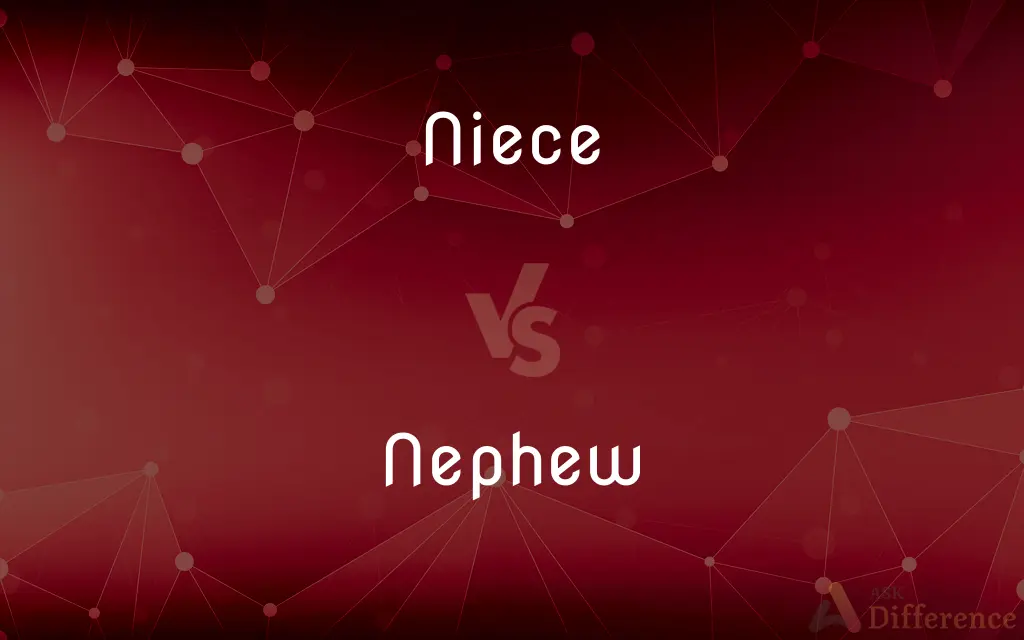Niece vs. Nephew — What's the Difference?
By Tayyaba Rehman — Updated on October 17, 2023
A niece is a daughter of one's sibling or sibling-in-law; a nephew is a son of one's sibling or sibling-in-law.

Difference Between Niece and Nephew
Table of Contents
ADVERTISEMENT
Key Differences
"Niece" refers to the daughter of an individual's sibling or sibling-in-law. Conversely, "nephew" signifies the son of one's sibling or sibling-in-law. These terms are specific in denoting the relationship and gender.
In terms of language origins, "niece" comes from the Old French "nece," while "nephew" originates from the Old French "neveu." Both words, though different in gender, stem from similar linguistic roots.
Regarding usage, "niece" and "nephew" are used when addressing or referring to a specific familial relationship. Despite this similarity, they cannot replace each other due to the gendered nature of these words.
Socially, nieces and nephews are often recipients of similar familial affection. However, traditional roles and cultural expectations might differ for a niece compared to a nephew, especially in societies with strong gender norms.
Legally, "niece" and "nephew" can denote specific beneficiaries in matters of inheritance or family law, but their rights and positions may vary based on jurisdiction, just as they are distinct in gender-related identity.
ADVERTISEMENT
Comparison Chart
Gender
Female
Male
Pronunciation
/niːs/
/ˈnɛfjuː/
Origin
Old French "nece"
Old French "neveu"
Possessive
Niece's (e.g., niece's birthday)
Nephew's (e.g., nephew's game)
Plural form
Nieces
Nephews
Compare with Definitions
Niece
A daughter of one's brother or sister.
My niece, Sarah, just started first grade.
Nephew
A male child of one's spouse's brother or sister.
My husband's brother has a nephew who just graduated high school.
Niece
A term used to describe close female children in an extended family or friendship circle.
Although not related by blood, I've always considered Lily my niece.
Nephew
In historical contexts, a grandson or distant male descendant.
Nobility often appointed a nephew as their heir in absence of children.
Niece
A female child of one's spouse's brother or sister.
My wife's sister has a delightful niece who loves painting.
Nephew
In zoology, a term sometimes used to describe the male offspring of a sibling animal.
Observing the lion pride, the biologist noted the protective behavior of the male toward his nephew.
Niece
In zoology, a term sometimes used to describe the female offspring of a sibling animal.
The alpha wolf is protective of his niece in the pack.
Nephew
A term used to describe close male children in an extended family or friendship circle.
Brian, my best friend's son, has always felt like a nephew to me.
Niece
In historical contexts, a granddaughter or distant female descendant.
In ancient texts, a queen might refer to her successor as a niece.
Nephew
A son of one's brother or sister.
My nephew, Jack, won his soccer game today.
Niece
The daughter of one's brother or sister or of the brother or sister of one's spouse.
Nephew
A son of one's brother or sister or of the brother or sister of one's spouse.
Niece
A daughter of one’s sibling, brother-in-law, or sister-in-law; either the daughter of one's brother ("fraternal niece"), or of one's sister ("sororal niece").
My niece just celebrated her 15th birthday.
Nephew
A son of one's sibling, brother-in-law, or sister-in-law; either a son of one's brother (fraternal nephew) or a son of one's sister (sororal nephew).
Niece
A relative, in general; especially, a descendant, whether male or female; a granddaughter or a grandson.
Nephew
A son of one's cousin or cousin-in-law
Niece
A daughter of one's brother or sister, or of one's brother-in-law or sister-in-law. In modern English, this is the primary meaning.
Nephew
(archaic) A son of one's child.
Niece
A daughter of your brother or sister
Nephew
A grandson or grandchild, or remoter lineal descendant.
But if any widow have children or nephews [Rev. Ver. grandchildren].
If naturalists say true that nephews are often liker to their grandfathers than to their fathers.
Nephew
A cousin.
Nephew
The son of a brother or a sister, or of a brother-in-law or sister-in-law.
Nephew
A son of your brother or sister
Common Curiosities
What is a nephew?
A nephew is the son of one's sibling or sibling-in-law.
What is a niece?
A niece is the daughter of one's sibling or sibling-in-law.
Can "nephew" refer to a female relative?
No, "nephew" specifically refers to a male relative.
Are the terms "niece" and "nephew" interchangeable?
No, they refer to different gender relationships within the family.
How do you pronounce "niece"?
"Niece" is pronounced as /niːs/.
Can "niece" refer to a male relative?
No, "niece" specifically refers to a female relative.
Can "niece" or "nephew" refer to non-blood relatives?
Colloquially, yes, to signify a close familial-like relationship.
How do you pronounce "nephew"?
"Nephew" is pronounced as /ˈnɛfjuː/.
Can a cousin's child be called a niece or nephew?
Traditionally, no, but it's used colloquially in some contexts.
What's the historical origin of "niece"?
"Niece" originated from the Old French "nece."
What's the plural of "niece"?
The plural is "nieces."
What's the plural of "nephew"?
The plural is "nephews."
Do "niece" and "nephew" have specific legal implications?
Yes, in legal contexts, they can denote specific rights or relationships.
Is there a gender-neutral term for niece/nephew?
Yes, "nibling" is a gender-neutral term, though less commonly used.
What's the historical origin of "nephew"?
"Nephew" originated from the Old French "neveu."
Share Your Discovery

Previous Comparison
Repeatedly vs. Repetitively
Next Comparison
Discipline vs. RegimentationAuthor Spotlight
Written by
Tayyaba RehmanTayyaba Rehman is a distinguished writer, currently serving as a primary contributor to askdifference.com. As a researcher in semantics and etymology, Tayyaba's passion for the complexity of languages and their distinctions has found a perfect home on the platform. Tayyaba delves into the intricacies of language, distinguishing between commonly confused words and phrases, thereby providing clarity for readers worldwide.













































